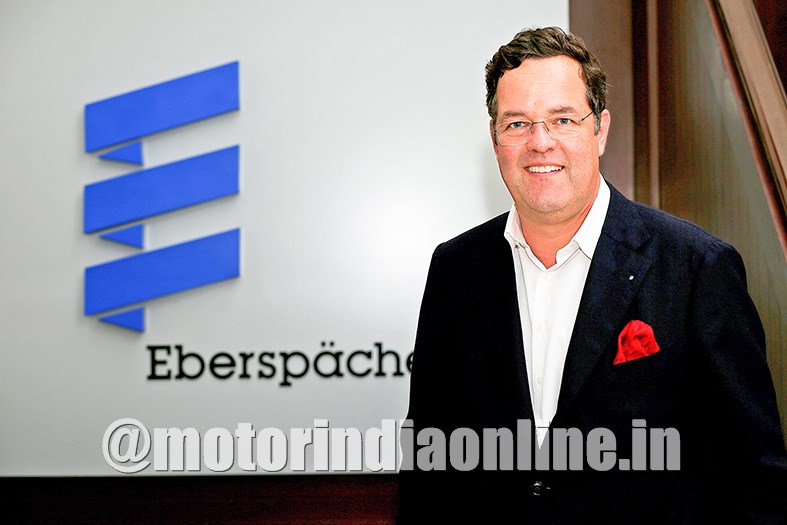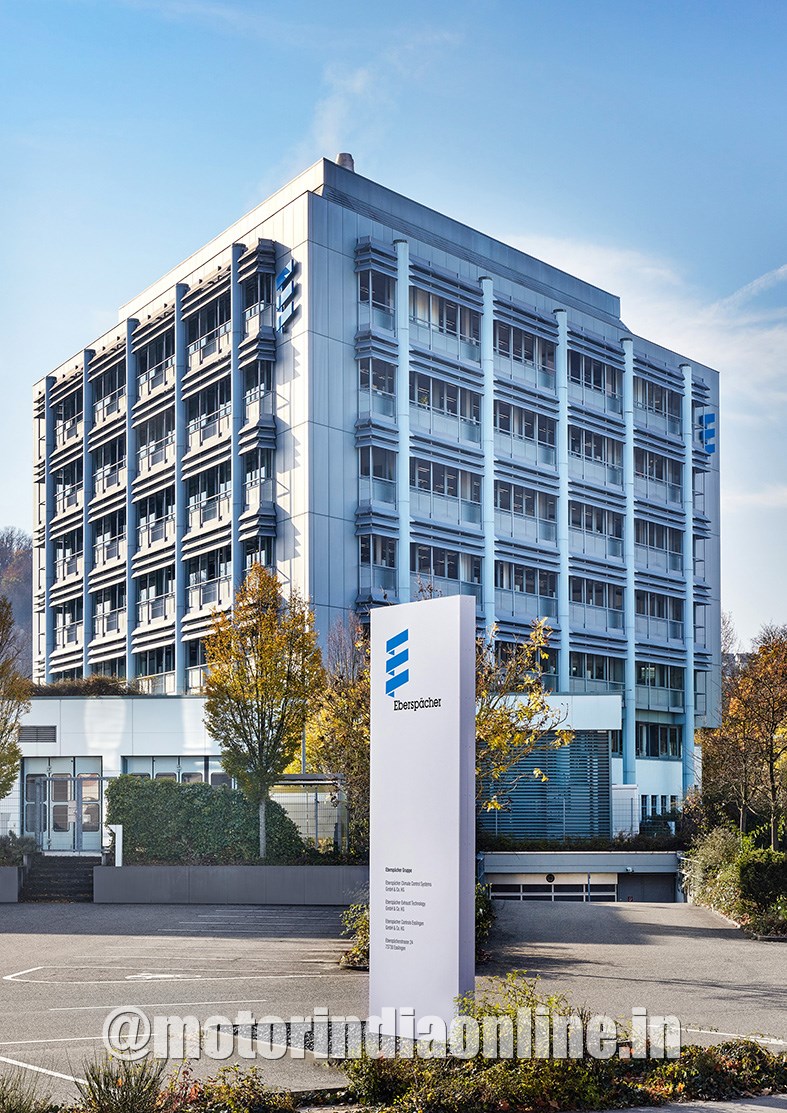Heinrich Baumann – the fifth-generation member of the family that owns the Eberspaecher Group – was in India to inaugurate their new plant in Bangalore. Also on the agenda was bonding with the officials of Sharda Motors – their JV partners in India for exhaust systems. Sarada Vishnubhatla was present to catch the buzz

Heinrich Baumann – the fifth-generation member of the family that owns the Eberspaecher Group, Germany – joined the family firm in 2004. As the current COO and Managing Partner, Baumann reflects the family’s thought process which is deep-rooted in their inherited legacy and is driven by their zeal to succeed in all the geographies they are present in. The two-fold purpose of his visit can be described as: first, to inaugurate the new Bangalore plant for bus air-conditioning systems and the second, to visit the premises of Sharda Motors in Delhi. Sharda Motors are their joint venture partners in the exhaust business in India.
On this occasion, Baumann gave an overview of the Indian market and what it holds forth for their business prospects: “India has always been an important market for us. As the market leaders in products for higher emission levels like Euro 6 in the United States, and Europe, we are convinced that this is the right time to re-enter the Indian market with more ideas.” Baumann welcomed the fact that it will take the group a “bit more time” to reach full capacity of the new plant. “Our long-term perspective is good. I am happy that we have managed to establish this plant with the business that we have done in the last eight years. India is an interesting manufacturing base for exports for us to the Middle East, for example,” he said.
Touching upon the company’s watchful yet steady investment in the Indian subsidiary, he said: “In the new plant, there will be new electrical lines for the electric air-conditioning systems for battery-electric buses. And we are further investigating if we can make business sense in vertically integrating some of the components like bent and brazed pipes for the cooling hoses for air-conditioning systems.” Their idea is to offer flexibility volume-wise to their customers, possible only “when we can control the parts as much as possible”.
The driving philosophy
Eberspaecher has different products doing well in different geographies. The group is strong in the exhaust business in Europe, the United States, Russia, South Africa, and now in India too. Elaborating about the company’s different products, Baumann said: “Every market needs exhaust systems – be they have hot or cold weather, be it a developing or a developed country. Bus air-conditioning systems are for warmer countries. Even so, in Central Europe almost every bus is equipped with the units and we are present relatively everywhere in the world including in the United States, Mexico, Brazil, besides of course in India. China is a competitive market in this regard. Our heating solutions are not primarily for India except for a few pockets where it is cold in winters. For colder countries like North America, Europe and the northern part of China, we offer both fuel-operated and electrical heaters.”
Eberspaecher’s electronics division is small and is present mainly in Europe and North America. Its commercial vehicle segment is growing steadily in these two markets, besides showing a robust growth in the passenger car market in China. With such an extensive footprint globally, the impact of the economic slowdown being witnessed by the world, and India too, has not been much, according to him.
Sharing the company’s philosophy, Baumann said: “At some point it is normal for the cycle to go down. We never make decisions for a specific point in time. For us, a project is for many years to come. If we are ramping up, then we can also manage the same in the workforce and adjust it to the volumes which will come. I do not see this slowdown as critical. It is true that the growth curve may be little less steep, but our investment in India is targeted for the long-term.”
Aligning with Industry 4.0
“We are well-established in our manufacturing logistics processes in most of our lines. Our machines measure and record all sorts of data, which gives us the opportunity to optimize the processes, the ERP system and simulation among others in the development process,” said Baumann.
Baumann pointed out the areas that interest them for future expansion in the domain of Industry 4.0. “In the bus air-conditioning systems, we have an interesting project where we want to use the data collected by the sensors from the electrical motors, compressors and other components to understand the failure mode of those parts and be able to do preventive maintenance. And not just that but propose a practical solution too, say like scheduling an appointment for an exchange of a component,” he said. Though this is still ‘in the future’ for Eberspaecher, Baumann believes that this is where they are headed because value-addition through digitalization for their customers automatically enhances the digital performance of their products.
Partners in success
The other aspect of Baumann’s current visit to India is to further deepen the ties with Sharda Motors. According to him, Sharda Motors possesses “unmatched skills” in the exhaust business and their competition is made up of large global firms, which in turn makes the equation highly valuable to Eberspaecher. “I visited the research and development centre of Sharda Motors in a bid to establish a personal relationship with them. It is interesting to see their capabilities, what they have achieved mainly on the passenger car market with regards to exhaust systems. Besides, we now want to start work on supplying exhaust systems to the commercial vehicle segment too,” shared Baumann.
The JV will be catering to HCVs including buses and trucks. And Eberspaecher, together with Sharda Motors, is eagerly looking forward to explore the off-road segment too before the new emission norms for the segment kick in by the year 2023-24. Currently, the partners are building prototypes for their customers. Eberspaecher Group will draw upon their experience in having launched Euro 6 and EPA 10 projects in Europe and the United States in the last decade to transfer the relevant knowledge to Sharda Motors in building prototypes in India. “We have significantly more experience with high emission standards. And since the knowledge is there already, it is just a question of how quickly we can adapt that to the Indian market,” he said.
“We have to ensure that our manufacturing process of the exhaust systems meets the expectations of our Indian customers. We will certainly be using local development resources that are necessary because of the proximity to the customer for quick visits,” Baumann added. One challenge facing them is maintaining global emission standards at a higher development cost. Compensation comes in the form of utilising local opportunities with less optimization and higher labour content which is possible in India where labour cost is economical, unlike in Europe. Looking forward, Eberspaecher Group will be setting up another plant up in north of India for exhaust systems. The reason is simple: Baumann sees tremendous growth potential in both the product lines in India.
